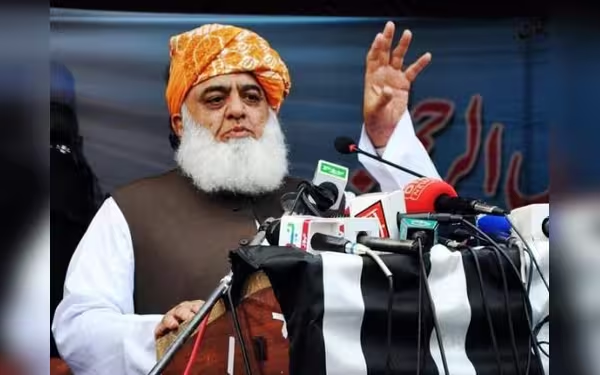Wednesday, December 4, 2024 06:53 PM
Maulana Fazlur Rehman Urges End to Political Violence in Pakistan
- Maulana Fazlur Rehman condemns violence in politics.
- Calls for dialogue and unity among political factions.
- Emphasizes responsibility of politicians for peaceful resolutions.
 Image Credits: urdupoint
Image Credits: urdupointMaulana Fazlur Rehman calls for an end to political violence in Pakistan, urging dialogue and responsibility among politicians for peace.
In recent times, Pakistan has witnessed a troubling trend of violence and unrest, particularly in the political arena. The ongoing conflicts and incidents of bloodshed have raised serious concerns among the populace and political leaders alike. One prominent voice against this violence is Maulana Fazlur Rehman, the Chief of Jamiat Ulema-e-Islam, who has been vocal about the need for peace and stability in the country.
During a press conference held at Khalid Mehmood Soomro Madarsa in Larkana, Maulana Fazlur Rehman firmly stated that the "politics of bloodshed cannot continue in the country." His remarks come in the wake of a tragic incident in Parachinar, where violence has escalated, leading to loss of life and property. The Maulana suggested that a Jirga, or tribal assembly, could be convened in the affected area to address the issues at hand and promote dialogue among the communities.
Maulana Fazlur Rehman emphasized the responsibility of politicians to guide their workers and voters towards peaceful resolutions rather than engaging in violence. He condemned the recent attacks on government property and the killing of police personnel, labeling such actions as "unacceptable." His strong stance reflects a growing frustration among many citizens who are weary of the ongoing turmoil and seek a return to normalcy.
Furthermore, the Maulana denounced the actions of Pakistan Tehreek-e-Insaf (PTI) workers in Islamabad, highlighting the need for accountability and responsible behavior from all political factions. His call for unity and peace resonates with a significant portion of the population that desires a stable and prosperous Pakistan.
The message from Maulana Fazlur Rehman serves as a crucial reminder that the path to a peaceful society lies in dialogue, understanding, and respect for the rule of law. As the nation grapples with its challenges, it is imperative for all political leaders to prioritize the well-being of the country over personal or party interests. Only through collective efforts can Pakistan hope to overcome the politics of bloodshed and build a brighter future for its citizens.













